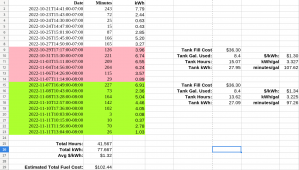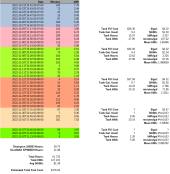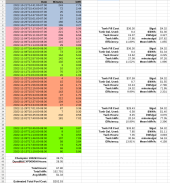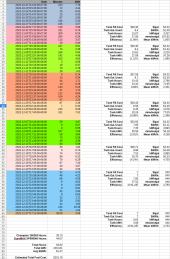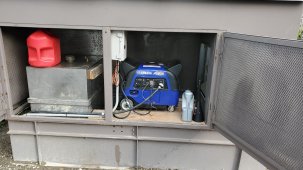Symbioquine
Solar Enthusiast
- Joined
- Jul 6, 2021
- Messages
- 428
I wanted to start this thread so folks have a place to compare real-world numbers about their generator efficiency.
This data is from two generators which I run exclusively on propane.
Up to 2022-11-10: Champion 100263 (Nominally a 3400 watt generator)
After 2022-11-10: DuroMAX XP9000iH (Nominally a 9000 watt generator)
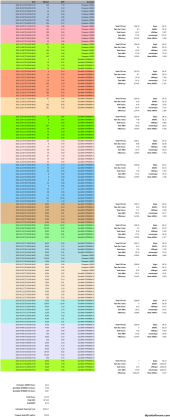
So the interesting potentially comparable numbers are:
$1.14 USD / kWh
~4.2 kWh / LPG Gallon
What sort of efficiency numbers are other folks getting?
Note #1: I've read https://diysolarforum.com/threads/natural-gas-generator-efficiency.49756 before, but as far as I recall it only includes theoretically numbers and guesses.
Note #2: Please feel free to share numbers regardless of fuel type. I think the comparison between fuel types may be interesting as well.
Note #3: I'll try to keep my data updated by updating the image above at least through the rest of this fall/winter season.
This data is from two generators which I run exclusively on propane.
Up to 2022-11-10: Champion 100263 (Nominally a 3400 watt generator)
After 2022-11-10: DuroMAX XP9000iH (Nominally a 9000 watt generator)

So the interesting potentially comparable numbers are:
$1.14 USD / kWh
~4.2 kWh / LPG Gallon
Code:
4.2 (kWh generated) / 27.988 (kWh total energy) = 15% efficiencyWhat sort of efficiency numbers are other folks getting?
Note #1: I've read https://diysolarforum.com/threads/natural-gas-generator-efficiency.49756 before, but as far as I recall it only includes theoretically numbers and guesses.
Note #2: Please feel free to share numbers regardless of fuel type. I think the comparison between fuel types may be interesting as well.
Note #3: I'll try to keep my data updated by updating the image above at least through the rest of this fall/winter season.
Attachments
Last edited:



